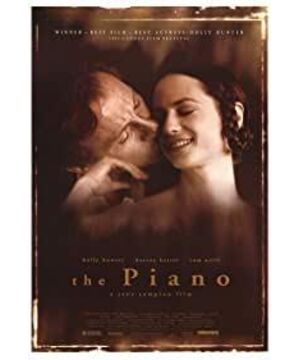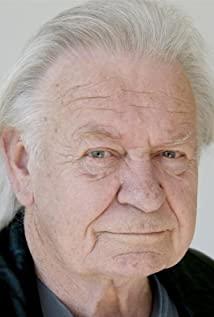I thought about it for a long time, and at a loss, I felt that neither of the two male protagonists was the love that the director wanted to praise. Or the director didn't want to sing about love. Ada didn't choose the "savage" baines. In the movie, she just chose to take a brave step and choose the life she loves. No longer imprisoned by the piano.
The film celebrates the life of love and the freedom of the soul above all else. When the film praises this concept, it does not take into account the shaping of the general values and morals of the society. Rather than calling it feminism, I personally think it's a search for a non-universal value. Like, being with someone I love regardless of who we are. Do what I love regardless of identity. Reconcile with my inner self and follow my inner love even though I love someone who used to force me. Running towards a free life despite being accused of cheating with his finger chopped off.
From the values, the heroine's soul is too independent from the beginning. The two male protagonists are incomparable. Or she has been out of the "secular" concept, out of the public's cognition. This also includes the universal values of "marrying a person, you must be responsible from the beginning to the end" and "marrying a person, you must try your best to accept the other person with all your heart". (I must admit that I also basically agree with this value.)
The polarizing reviews of the film focused on ada's "physical infidelity". I've always wondered if women are free without marriage responsibilities. Whether love and morality are the themes of this film or not. It has nothing to do with whether the husband understands her or not. After all, whether her husband understands her or not, this responsibility has always existed.
Because the ideological values that I agree with are "a gentleman argues without regard to his heart, and there is no perfect person in the world." Judging from the video, although the husband does not understand ada, he is still performing his responsibilities and still respects ada. The respect of the husband is reflected in his body. He did not force ada to contact him or invade her life. However, his behavior of abandoning the piano, asking Ada to give up the piano, and forcing Ada to teach piano lessons, just aimed at Ada's heart (this is precisely what Ada values most)
The husband's values are "you will take this responsibility when you marry me." Traditional values. So he asked Ada to teach B piano lessons without any worries. One is that ada's character status is difficult to derail. The second is that he defaults to ada and his values. Some people say that he personally pushed ada to baines, but there will be other people without baines. Ada and her husband have completely different values. The important thing is that the husband is questioning ada with his own values. This is ada's inner resistance.
Let's talk about the baines who were discussed "physical seduction". Baines deliberately got close to ada physically, but respected the piano and ada's heart. He silently watched ada play the piano freely by the sea and let himself go from day to night. The line he said to Ada, "Play what you want, do what you want" is a stark contrast to the lord's "Is there something wrong with her brain". Of course, here is not talking about the right or wrong of the two. Just from the ada thought, the mind is a little more important than the body. The practice of baines is more satisfying to ada's heart. (though baines physically asks ada to swap keys with touch)
"Women's liberty and marital responsibility." This idea kept me conflicted while watching the film, (I think a lot of people do too) and then I realized that watching this film can't be moral, or, in other words, can't have a universal moral. . The good and bad moral values embodied in this film are superficial, just to show ada's inner awakening process. She is not a woman to be measured by universal values. Western values seem to be more important than behavior, and China's "theory of the gentleman, regardless of the heart" is difficult to apply. As most popular film critics write, "Although Baines' behavior is seduction, Baines understands ada." This is the concrete demonstration of the concept of heart > behavior. The term "seduction" is something coined by universal values, while "understanding ada" tends towards another value.
Sure enough, ada and baines are together. Physically, Ada is indeed cheating as a wife. But from the heart, it's just the process of her opening up to Baines. From the heart, it is really difficult to have a "derailment". After all, she never had the slightest affection for the lord.
Therefore, from the perspective of values, the scene of "cutting fingers" is not only a moral conflict and anger at "derailment" (after all, derailment is also a concept word for universal values), but becomes a fierce collision of values.
My husband doesn't understand ada, but Baines doesn't know much either. Their values and ada may not be the same. But the husband is using his own values to measure and imprison ada. In terms of behavior, baines may be wrong or wrong, but in short, baines show more understanding and acceptance of ada's ideas and values. In this way, the values of the two people have the opportunity to blend and converge.
Those who like this film seem to be supporting women to abandon the life they don't like. This isn't the only way a woman can leave a life she doesn't like. However, it is meaningless to discuss this in this film, after all, the film just uses this method to show endless romanticism and freedom.
When I wrote the review, I gave it three stars and after I wrote it, I thought about it and changed it to four stars. Raise this film to the display of the collision of values and soul thoughts, and find that it is much more worth watching.
We always acquiesce that no matter what, falling in love with someone else in a marriage is cheating. This is due to laws and universal values. But in non-universal values, there may be a different perception of perception. This is also worth knowing. Compared to the film and its values that are basically recognized, such as optimism and self-improvement (The Shawshank Redemption, the film's narrative focuses on the intersection of values of all different values), love and protection (Titanic). The values of piano lessons are even more original. Perhaps understanding the values of the non-self (whether you accept it or not, whether it conforms to the law or not) is to understand the larger world
View more about The Piano reviews










